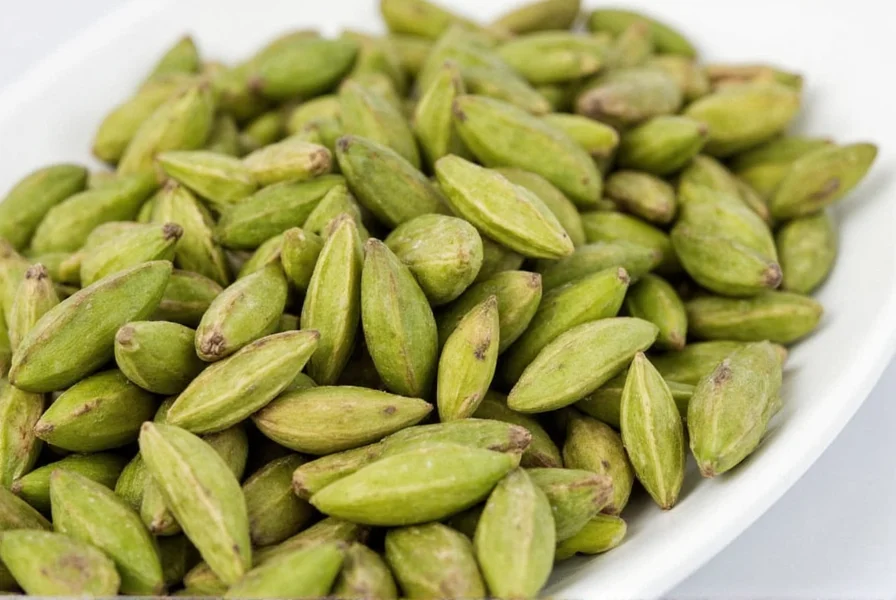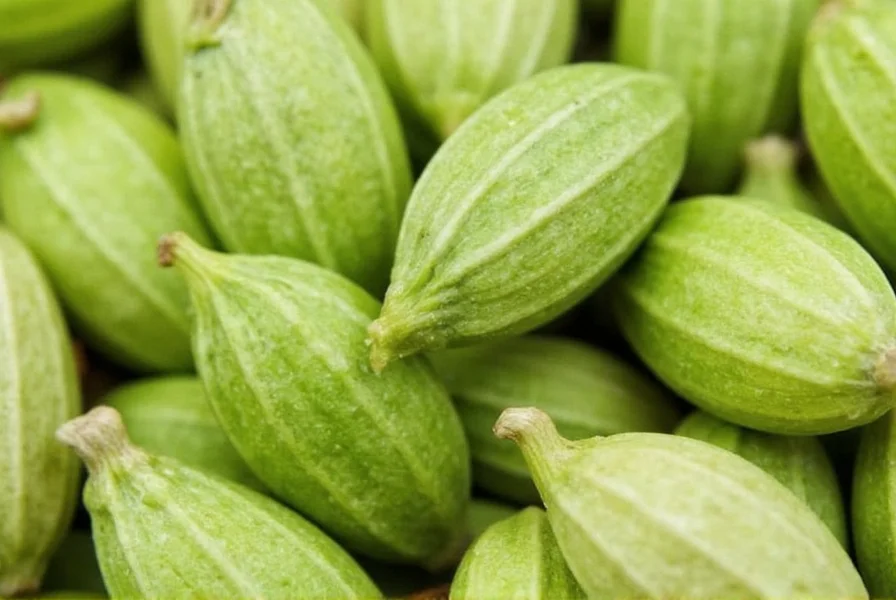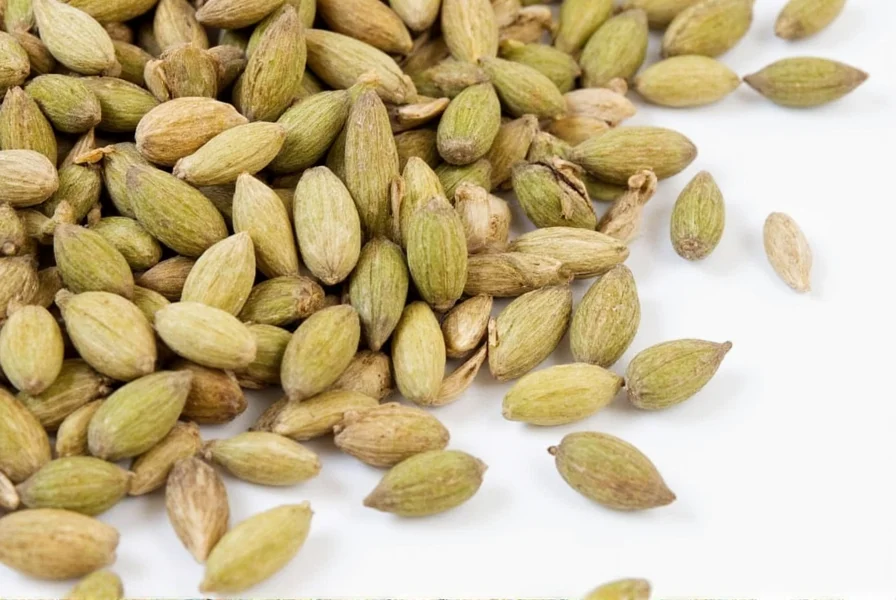Cardamom, known as the “Queen of Spices,” has been used in traditional medicine systems for centuries. Modern science is now validating many of these traditional applications through rigorous research. This aromatic spice contains over 300 chemical compounds, with terpenes like cineole and limonene being particularly significant for health benefits.
Scientific Composition of Cardamom
Cardamom (Elettaria cardamomum) belongs to the Zingiberaceae family, which includes ginger and turmeric. The green variety is most commonly used for culinary and medicinal purposes. Its therapeutic properties stem from its rich phytochemical profile:
| Key Compound | Concentration | Health Significance |
|---|---|---|
| 1,8-cineole | 20-50% | Anti-inflammatory, respiratory support |
| Limonene | 5-10% | Digestive aid, antioxidant |
| Alpha-terpinyl acetate | 3-8% | Antimicrobial properties |
| Flavonoids | Varies | Powerful antioxidants |
These compounds work synergistically to provide cardamom's therapeutic effects. Research published in the Journal of Agricultural and Food Chemistry confirms cardamom ranks among the top 10 antioxidant-rich spices, with an ORAC value of approximately 1,500 μmole TE/g.

Evidence-Based Health Benefits of Cardamom
Multiple scientific studies have investigated cardamom's health-promoting properties. Let's examine the most promising applications supported by research.
Cardiovascular Health Support
A 12-week clinical trial published in the Indian Journal of Biochemistry and Biophysics found that participants with stage 1 hypertension who consumed 3 grams of cardamom powder daily experienced significant reductions in both systolic and diastolic blood pressure. Researchers attribute this effect to cardamom's high antioxidant content, which improves endothelial function and reduces oxidative stress.
Additional research in Phytotherapy Research demonstrated that cardamom extract reduced total cholesterol and triglyceride levels in animal models. While human studies are limited, these findings suggest cardamom benefits for blood pressure management may extend to overall cardiovascular health.
Digestive System Enhancement
Traditional Ayurvedic medicine has long recommended cardamom for digestive issues. Modern science supports this use: a study in the Journal of Ethnopharmacology found cardamom extract significantly accelerated gastric emptying and reduced intestinal spasms in laboratory models.
Cardamom's digestive benefits stem from several mechanisms:
- Stimulates bile production for fat digestion
- Reduces intestinal gas and bloating
- Exhibits carminative properties that relieve flatulence
- May protect against gastric ulcers through antioxidant activity
Antioxidant and Anti-inflammatory Properties
Cardamom contains potent antioxidants including flavonoids, polyphenols, and terpenes. Research in Food Chemistry shows cardamom extract effectively scavenges free radicals and boosts the body's natural antioxidant enzymes like glutathione peroxidase.
These antioxidant properties translate to measurable anti-inflammatory effects. A study in Inflammation Research demonstrated that cardamom extract reduced inflammatory markers like TNF-α and IL-6 in cellular models. This suggests potential cardamom health benefits for inflammatory conditions, though more human trials are needed.
Respiratory Health Applications
The cineole content in cardamom makes it particularly valuable for respiratory health. Research published in Lung India found that cardamom's essential oil components act as natural expectorants, helping clear mucus from airways.
Traditional preparations of cardamom tea for respiratory ailments have scientific backing: a study in Phytotherapy Research showed that cardamom compounds relax bronchial muscles, potentially offering relief for asthma symptoms. However, cardamom should never replace prescribed respiratory medications.
Traditional Uses vs. Scientific Evidence
While many traditional uses of cardamom exist, it's important to distinguish between cultural practices and scientifically validated benefits. The table below compares common traditional applications with current scientific understanding:
| Traditional Use | Scientific Support | Research Status |
|---|---|---|
| Digestive aid for bloating | Strong evidence | Multiple human studies |
| Blood pressure reduction | Moderate evidence | Promising clinical trials |
| Diabetes management | Preliminary evidence | Animal studies only |
| Cancer prevention | Very limited evidence | In vitro studies only |
| Dental health improvement | Moderate evidence | Lab studies on antimicrobial effects |
How to Incorporate Cardamom for Health Benefits
To maximize cardamom benefits for digestive health and other applications, consider these evidence-based approaches:
Optimal Consumption Methods
- Whole pods for tea: Crush 3-4 pods and steep in hot water for 10 minutes. This preserves volatile compounds better than pre-ground spice.
- Culinary use: Add to rice dishes, curries, or baked goods at the end of cooking to preserve active compounds.
- Chewing method: Traditional practice of chewing whole pods after meals aids digestion and freshens breath.
Daily Dosage Recommendations
Research suggests effective doses range from 1.5 to 3 grams daily for therapeutic benefits. This equals approximately:
- 1/2 to 1 teaspoon of ground cardamom
- 6-12 whole pods
- 2-3 cups of cardamom tea
Consistency matters more than single large doses. Daily consumption over weeks shows better results than occasional large amounts, according to longitudinal studies on spice consumption.

Safety Considerations and Potential Side Effects
Cardamom is generally recognized as safe (GRAS) by the FDA when consumed in typical culinary amounts. However, certain precautions apply when using cardamom for health benefits:
Who Should Exercise Caution
- Pregnant women: Limited evidence suggests high medicinal doses might stimulate uterine contractions
- People with gallstones: Cardamom may increase bile production, potentially causing discomfort
- Those on blood thinners: Theoretical interaction due to coumarin content, though levels are low
- Individuals with low blood pressure: May enhance effects of antihypertensive medications
Documented Side Effects
When consumed within recommended amounts, cardamom rarely causes issues. Potential side effects include:
- Mild heartburn in sensitive individuals
- Rare allergic reactions (more common with occupational exposure)
- Increased thirst due to diuretic effect
Always consult with a healthcare provider before using cardamom medicinally, especially if managing chronic health conditions or taking prescription medications. Cardamom should complement, not replace, conventional medical treatments.
Conclusion: Evidence-Based Perspective on Cardamom Uses
Cardamom demonstrates promising health benefits supported by growing scientific evidence, particularly for digestive health, blood pressure management, and antioxidant protection. While traditional medicine systems have utilized cardamom for centuries, modern research is beginning to validate many of these applications through controlled studies.
The most compelling evidence supports cardamom's role in digestive health and cardiovascular support, with emerging research on its anti-inflammatory and respiratory benefits. As with any natural remedy, realistic expectations are important—cardamom works best as part of a comprehensive healthy lifestyle rather than as a standalone treatment.
Future research directions include larger human clinical trials, particularly examining cardamom's potential benefits for metabolic health and chronic inflammatory conditions. For now, incorporating moderate amounts of cardamom into your diet represents a safe and potentially beneficial practice supported by both tradition and science.
Frequently Asked Questions
What are the most scientifically supported health benefits of cardamom?
The most scientifically supported cardamom health benefits include digestive support, blood pressure reduction, and antioxidant protection. Clinical studies show cardamom can improve gastric emptying, reduce intestinal spasms, and lower both systolic and diastolic blood pressure in people with stage 1 hypertension. Its high antioxidant content, particularly from compounds like cineole and limonene, helps combat oxidative stress and inflammation.
How much cardamom should I consume daily for health benefits?
Research suggests 1.5 to 3 grams of cardamom daily provides therapeutic benefits. This equals approximately 1/2 to 1 teaspoon of ground cardamom, 6-12 whole pods, or 2-3 cups of cardamom tea. Consistent daily consumption over weeks shows better results than occasional large doses. For blood pressure benefits specifically, studies used 3 grams daily for 12 weeks.
Can cardamom help with digestion and bloating?
Yes, cardamom has demonstrated digestive benefits. Studies show it accelerates gastric emptying, reduces intestinal spasms, and acts as a carminative to relieve gas and bloating. The compounds in cardamom stimulate bile production for fat digestion and relax smooth muscles in the digestive tract. Traditional practice of chewing cardamom pods after meals has scientific backing for improving digestion and reducing discomfort.
Are there any side effects of consuming cardamom for health purposes?
Cardamom is generally safe when consumed in typical culinary amounts. Potential side effects at medicinal doses include mild heartburn in sensitive individuals, increased thirst due to diuretic effects, and rare allergic reactions. People with gallstones should use caution as cardamom may increase bile production. Those on blood pressure medications should monitor levels as cardamom may enhance medication effects. Always consult your healthcare provider before using cardamom medicinally.
How does cardamom compare to other spices for health benefits?
Cardamom ranks among the top antioxidant-rich spices, with an ORAC value of approximately 1,500 μmole TE/g. While turmeric has stronger anti-inflammatory properties due to curcumin, cardamom offers unique benefits for digestive and respiratory health. Unlike many spices that lose potency when heated, cardamom's therapeutic compounds remain stable during cooking. For comprehensive health benefits, incorporating a variety of spices including cardamom, turmeric, ginger, and cinnamon provides synergistic effects.











 浙公网安备
33010002000092号
浙公网安备
33010002000092号 浙B2-20120091-4
浙B2-20120091-4